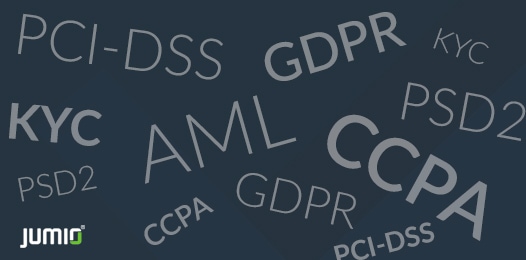
GDPR. AML. KYC. PSD2. CCPA…The acronyms just keep on coming and with them, increasingly stringent and complex requirements for businesses to meet. While delivered with good intention to protect consumers and the global financial system, these mandates and compliance edicts naturally add complexity to business processes.
Our latest e-book, Compliance Made Simple, will help you unscramble compliance in your customer identity verification process. Jump ahead and get your copy now.
Are your online customers who they claim to be?
The digital world has opened up entire new pathways for fraudsters, money launderers, and identity thieves to assume another person’s identity and wreak havoc on innocent people, companies, and even entire industries. As a result, there is a rising tide of concern that the people you do business with and the people you connect through your business are authentic.
Online customer identity verification helps tie your customers’ digital identities (who they claim to be) to their real world identities (who they are in real life). This “match” is key to building a strong online brand, preventing fraud, and converting good customers.
Your identity verification process adds layers of trust and safety as consumers go through the process of verifying their ID documents and other identity markers. However, each layer of the identity verification process also tends to require that customers reveal more and more of their personal identifying information. This information needs protection.
Lawmakers are trying to help.
As a result of several recent high profile data breaches and an increasing rate of identity theft and fraud, lawmakers face a growing chorus of concern over consumer privacy and data protection online. The response has come from many angles and resulted in new and renewed focus on mandates such as AML, 4AMLD, PCI-DSS, KYC, PSD2, GDPR, and CCPA.
To help you understand these regulations their potential impact on your customer identity verification program, we have created a new e-book, Compliance Made Simple. In it, you’ll get an overview of 7 key regulations to consider as you subject your customers and online users to ID, identity, or document verification processes. It will also run through considerations to help you choose the right identity verification provider with the systems and processes in place to support and enable your compliance.
Here’s a quick rundown of what’s covered in the e-book:
1. General Data Protection Regulation (GDPR)
Find out the surprising way this regulation, which requires businesses to protect the personal data and privacy of EU citizens, impacts both your company and your selection of a compliant identity verification provider.
2. California Consumer Privacy Act (CCPA)
Are you ready? This new California law, set to come into effect at the start of 2020, will likely be the strictest data privacy law in the United States. Some suspect it will be even broader and stricter than those imposed by GDPR in the EU. What do you need to know and how will this impact your identity verification program?
3. Know Your Customer (KYC)
In the financial services arena, customers want the account opening process to be fast, easy, and online. Meanwhile, financial institutions are grappling with how to offer this experience while meeting stringent KYC and related AML compliance requirements. See what an ideal solution can look like.
4. Anti-Money Laundering (AML)
Though anti-money laundering laws cover a relatively limited number of transactions and criminal behaviors, their implications are far-reaching. Online identity verification is the natural starting point for AML compliance in a digital world so it makes sense that your program is impacted. To what extent? Download Compliance Made Simple to get our take.
5. 4th Anti-Money Laundering Directive
The European Union’s Fourth Anti-Money Laundering Directive went into effect in June 2017 with the purpose of removing any ambiguities in the previous legislation and improving the consistency of anti-money laundering (AML) and counter terrorist financing (CTF) rules across all EU Member States. We explore how these changes impact your online identity verification program and offer guidelines to help you get in compliance.
6. Revised Payment Service Directive (PSD2)
PSD2 requires a process called “Strong Customer Authentication.” What does this mean? And are you subject to it? Let us fill you in.
7. Payment Card Industry (PCI-DSS) Compliance
PCI-DSS applies to all entities involved in payment card processing—including merchants, processors, acquirers, issuers, and service providers. It also applies to entities that store, process, or transmit cardholder data and/or sensitive authentication data. So yeah, that probably means you. But how does this relate to identity verification? The answer might surprise you.
Ready to unscramble the compliance requirements within your online customer identity verification program? Get your copy of Compliance Made Simple.
